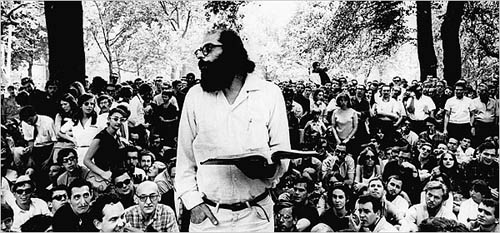
Allen Ginsberg reading “Howl” in Washington Square in 1966. (Associated Press)
Yesterday marked the 50th anniversary of the famous court ruling in defense of Allen Ginsberg’s “Howl” against charges of obscenity, citing the poem’s “redeeming social importance.” The Times reports how New York radio station WBAI had the idea of airing a recording of Ginsberg reading his poem to commemorate defense, but was ultimately dissuaded by its lawyers, who feared that an increasingly zealous FCC could fine the station out of existence. The poem did end up airing freely online on pacifica.org, where where the FCC stormtroopers have no jurisdiction. There, under the banner “Howl Against Censorship,” you can still hear it with comments by Lawrence Ferlingetti and other sages of the Beat era (there’s also a link to a full online text of the poem). Worth checking out.
What’s funny and more than a little sad about this story is its utter banality. This isn’t a drag-out battle against the thought police – ?it’s censorship drained of meaning. Because Janet Jackson accidentally let a boob fly at the 2004 Super Bowl, and a few others’ assorted lewd utterances on live TV, the humorless puritans at the FCC have knuckled down into zero tolerance mode. A few incidental curse words, not the actual substance of “Howl,” seem to be at issue here, and that’s what’s truly worrisome.
In ’57, there seemed to be something real at stake concerning free speech: not in the surface indecency of Ginsberg’s language, but in the heart of his protest and lament at the whole of American civilization. The Times quotes Ferlingetti:
Mr. Ferlinghetti, 88, who owns the landmark City Lights bookstore in San Francisco, said that when “Howl” was labeled obscene, first by United States Customs agents and then by the San Francisco police, it “wasn’t really the four-letter words.” He added, “It was that it was a direct attack on American society and the American way of life.”
If anything, this latter-day episode demonstrates how our culture is on auto pilot, that we’ve become so perfunctorily litigious in the mediation of language and symbols, that the masterpiece “Howl” might as well have been a recipe for pancakes or a wall message from MySpace. The poem’s gorgeous threat has been dulled by a larger and pervading numbness. Kudos, of course, to Pacifica for trying valiantly to break through it, but even if the poem had transmitted uncensored on FM radio, or had it been some other work, ten times as damning but without a trace of profanity, would anyone have even been awake enough to receive it?

That’s basically the story of avant-garde writing in the 20th century. Integrate a little deviant sex or defecation into your masterful study of humanity or your critique of civilization and you just bought yourself an injunction from the Post Office or the Society for the Suppression of Vice.
The thing about poems like “Howl” and “America” is that they respond to the immediate politics of their time, much of which gets lost now. Of course some aspects are still relevant — the arms race, war, censorship — but even those problems that are still with us have a different configuration than they did for Ginsberg. And the surface obscenity that made the real threat so gorgeous in the late 50s gets lost in the glut of mere obscenity we’re bombarded with every day. If you want to avoid provocative ad images, exploitative reality TV, bravado- and threat-laden music lyrics, or even the obscenity that abounds the news, you have to try very hard. Unfortunately the Audience, which includes citizens of all stripes plus the FCC, mostly lacks the talent to feel why the obscenity or its real content is a threat.
A friend of mine from the dog run was an experimental dramatist here in NY during the 50s and knew the Beats personally. One morning he told me that the audience in the 50s and into a little bit of the 60s had great talent as an audience, whereas nowadays the audience has virtually none, not even the audience that has a taste for the avant-garde. That comment has stuck with me ever since.
There was a very interesting article in _The New Republic_ recently by Steven Pinker entitled “What the F***” about obscenity and censorship that I feel is relevant to this article, if you haven’t read it yet: http://www.tnr.com/doc.mhtml?i=20071008&s=pinker100807
In case it’s of interest, the Kronos Quartet accompany a Ginsberg rendition of Howl on this record, originally released in 1996. It’s as menacing and unsettling a performance as you might wish for.